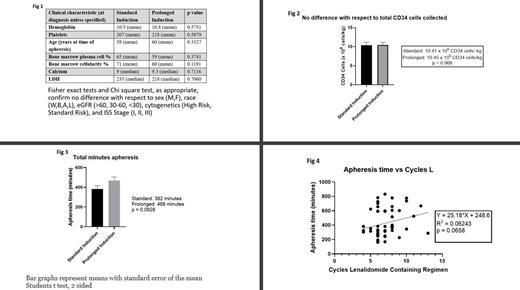Abstract
Introduction: Standard induction therapy for multiple myeloma consists of 3-6 cycles of bortezomib, lenalidomide, and dexamethasone (VRd) or carfilzomib, lenalidomide and dexamethasone (KRd). Receiving greater than 6 cycles of a lenalidomide containing regimen is thought to negatively impact the ability to collect sufficient CD34+ stem cells for autologous stem cell transplant (Kumar, Dispenzieri et al. 2007, Bhutani, Zonder et al. 2013). Due to the COVID-19 pandemic, at least 20 patients at University of Maryland Greenebaum Comprehensive Cancer Center (UMGCC) had transplant postponed, potentially resulting in prolonged exposure to lenalidomide containing induction regimens. Here, in the context of modern stem cell mobilization methods, we describe a retrospective study that suggests prolonged induction does not inhibit adequate stem cell collection for transplant.
Methods: By chart review, we identified 56 patients with multiple myeloma who received induction with VRd or KRd and underwent apheresis or stem cell transplant at UMGCC between 10/1/19 and 10/1/20. Patients were excluded if they received more than 2 cycles of a different induction regimen, had a past medical history of an inborn hematological disorder, or participated in a clinical trial of novel stem cell mobilization therapy. We defined 1 cycle of VRd or KRd as 1 cycle of "lenalidomide containing regimen". In accordance with routine clinical practice, we defined standard induction as having received 3-6 cycles of lenalidomide containing regimen and prolonged induction as having received 7 or more cycles.
Results: 29 patients received standard induction (Standard induction cohort) and 27 received prolonged induction (Prolonged induction cohort) with lenalidomide containing regimens. The median number of cycles received by the Standard cohort was 6 (range 4-6), and the median number of cycles received by the Prolonged cohort was 8 (range 7-13). The frequency of KRd use was similar between patients who received standard induction and prolonged induction (27.58% vs. 25.93%, respectively). Standard induction and Prolonged induction cohorts were similar with respect to clinical characteristics (Fig 1), as well as the mobilization regimen used for stem cell collection (p = 0.6829).
55/56 patients collected sufficient stem cells for 1 transplant (≥ 4 x 10 6 CD34 cells/kg), and 40/56 patients collected sufficient cells for 2 transplants (≥ 8 x 10 6 CD34 cells/kg). There was no significant difference in the total CD34+ stem cells collected at completion of apheresis between standard and prolonged induction (10.41 and 10.45 x 10 6 CD34 cells/kg, respectively, p = 0.968, Fig 2). Furthermore, there was no significant correlation between the number of cycles of lenalidomide containing regimen a patient received and total CD34+ cells collected (R 2 = 0.0073, p = 0.5324).
Although prolonged induction did not affect final stem yield, prolonged induction could increase the apheresis time required for adequate collection or result in more frequent need for plerixafor rescue. There was no significant difference in the total number of stem cells collected after day 1 of apheresis between patients who received standard or prolonged induction (8.72 vs. 7.96 x 10 6 cells/kg, respectively, p = 0.557). However, patients who received prolonged induction were more likely to require 2 days of apheresis (44% vs. 25%, p = 0.1625) and there was a trend toward significance in which patients who received prolonged induction underwent apheresis longer than patients who received standard induction (468 vs 382 minutes, respectively, p = 0.0928, Fig 3). In addition, longer apheresis time was associated with more cycles of lenalidomide containing regimen, which neared statistical significance (R 2 = 0.0624, p = 0.0658, Fig 4). There was no significant difference between standard and prolonged induction with respect to the frequency of plerixafor rescue.
Conclusions: Prolonged induction with lenalidomide containing regimens does not impair adequate stem cell collection for autologous transplant. Prolonged induction may increase the apheresis time required to collect sufficient stem cells for transplant, but ultimately clinicians should be re-assured that extending induction when necessary is not likely to increase the risk of collection failure.
Badros: Janssen: Research Funding; J&J: Research Funding; BMS: Research Funding; GlaxoSmithKline: Research Funding.


